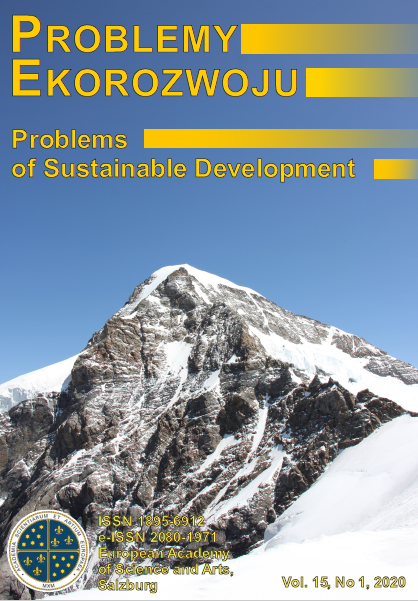Theatre for Sustainable Development: Jana Sanskriti’s Participatory Ideologue and Practice
Article Sidebar
Open full text
Issue Vol. 15 No. 1 (2020)
-
China’s Environmental Protection in the New Era from the Perspective of Eco-civilization Construction
Qingzhi Huan7-14
-
The Function and Perception of Urban Ecosystem Services in the Society
Fredrik Edlund15-23
-
Immigration and Social Aspects of Sustainable Development. The Case of Germany
Paweł Rydzewski25-31
-
Achieving Sustainable Competitive Advantage Through Intellectual Capital and Corporate Character: The Mediating Role of Innovation
Huan Xiao, Dengke Yu33-45
-
Ethics of Sustainable Development from the View of A. Badiou’s Critique of Contemporary Ethics
Andrzej Papuziński47-52
-
Ecological Performance: Ethnic Fragmentation versus Governance Quality and Sustainable Development
Viktor Koziuk, Yuryi Hayda, Oleksandr Dluhopolskyi, Serhii Kozlovskyi53-64
-
The Theoretical Foundations of Management in Terms of the Implementation of the Process of Globalization and Sustainable Development in the Real Sphere
Franciszek Piontek65-69
-
Does Appearance of the Migrants Change Citizens Perception of the Public Space? Case Study of Disturbed Sustainability, Belgrade, Serbia
Nataša Danilović Hristić, Nebojša Stefanović71-80
-
Consumption and Sustainable Development: Ethical Aspects
Maria Miczyńska-Kowalska81-88
-
The Role of Language in Sustainable Development: Multilingualism and Language Literacy in India
Neha Toppo, Mojibur Rahman89-93
-
Value Theory in the Economics of Sustainable Development
Małgorzata Pink95-102
-
Women’s Attitude Towards Environment Sustainability Through Natural Preservation
Jyoti Kumari, Ajit Kumar Behura, Sarita Kar103-107
-
The Impact of Selected Biotechnology Processes for Sustainable Development of the Environment and Human Life
Aleksandra Badora, Magdalena Celińska109-117
-
Surveys as Means of Understanding User-behaviour with Respect to Energy Usage in Households, Prior to Decision-making to Promote Sustainability
G Venkatesh, Are Kjeang119-134
-
Sustainable Habitat as the Main Factor of Urbanization Development: 19th-20th Centuries
Azizov Aghasalim135-148
-
A Comprehensive Approach: Inclusive, Smart and Green Urban Development
Justyna Przywojska, Aldona Podgórniak-Krzykacz149-160
-
Corporate Sustainability Practices in Polluting Industries: Evidence from India, China and USA
Prem Sagar Mishra, Ajay Kumar, Niladri Das161-168
-
The Possibility of Using Winter Oilseed Rape (Brassica napus L. var. Napus) for Energy Purposes
Jakub Siemek, Jan Macuda, Łukasz Łukańko, Jakub Nowak, Tadeusz Zając167-177
-
Reconsidering Land System Changes in Borderlands: Insights from the China-ASEAN Borderland
Xiaobo Hua, Yasuyuki Kono179-187
-
NER300: Success or Failure of Public Support for Low-emission Technologies?
Grażyna Borys189-196
-
The Identification of the Luhansk Region and the Region Act’s According to the Qualification of Their Sustainable Development in the Conditions of the Joint Forces Operation
Inna Zablodska, Svitlana Hrechana, Daria Zablodska197-210
-
Sustainable Development Goals in Arab Region – United Arab Emirates’ Case Study
Adam Krzymowski211-220
-
Theatre for Sustainable Development: Jana Sanskriti’s Participatory Ideologue and Practice
Shubhra Ghoshal, Nirban Manna221-227
-
Risk and Uncertainty in Sustainable Development: Undertaking Politics of the Climate Change in the United States
Olena Ovchynnikova229-235
Archives
-
Vol. 17 No. 2
2022-07-04 26
-
Vol. 17 No. 1
2022-01-03 28
-
Vol. 16 No. 2
2021-07-01 26
-
Vol. 16 No. 1
2021-01-04 24
-
Vol. 15 No. 2
2020-07-01 24
-
Vol. 15 No. 1
2020-01-02 24
-
Vol. 14 No. 2
2019-07-01 20
-
Vol. 14 No. 1
2019-01-02 20
-
Vol. 13 No. 2
2023-10-15 22
-
Vol. 13 No. 1
2018-01-02 23
Main Article Content
DOI
Authors
ghoshal_shubhra@rediffmail.com
Abstract
As a reaction against the institutionalized top-down developmental orientation, the theory and praxis of development as an inclusive process of socio-political collective transformation has been constantly realized. At this juncture, performative activities have become increasingly instrumental strategies in engaging people more intrinsically in their various personal and social development issues. The focus of this paper lies in studying Jana Sanskriti Centre for Theatre of the Oppressed, which despite being an apolitical organisation, offers significant contribution towards searching for viable socio-political possibilities in contemporary India. The paper delves into discussing some specific ground realities of rural West Bengal, deliberating on the endeavours of Jana Sanskriti in extending onstage representations to offstage reformation. This research investigates how sustainable changes, defined as both individual psychological transformation and groups’ socio-political consciousness are generated among spectators through participation in this theatrical process.
Keywords:
References
BOAL A., 2006, The Aesthetics of the Oppressed, trans. Adrian Jackson, Routledge, London and New York. DOI: https://doi.org/10.4324/9780203969830
CARSON M. A., 1984, Theories of the Theatre: A Historical and Critical Survey, from the Greeks to the Present, Cornell University Press, Ithaca and London.
COSTA D.D. (ed.), 2010, Scripting Power: Jana Sanskriti on and Offstage, CAMP, Kolkata.
COSTA D.D., 2007, Tensions of neo-liberal development: State discourse and dramatic oppositions in West Bengal, in: Contributions to Indian Sociology, 41(3), p. 293. DOI: https://doi.org/10.1177/006996670704100301
DUTTA M., 2015, Theatre for Social Change, Diss. Tata Institute of Social Sciences, p. 61-69.
GANGULY S., 2009, Where WE Stand: Five Plays from the repertoire of Jana Sanskriti. Trans. Dia Mohan Dacosta, CAMP, Kolkata.
GANGULY S., 2010, Jana Sanskriti: Forum Theatre and democracy in India, Routledge, New York. DOI: https://doi.org/10.4324/9780203852729
GHOSHAL S., NIRBAN M., 2017, Boal’s Reception in India: Dialogism of Jana Sanskriti’s Theatre of the
Oppressed, in: Journal of Dharma, 42(1), p. 201-218.
MILLS S., 2009, Theatre for transformation and empowerment: a case study of Jana Sanskriti Theatre of the Oppressed, in: Development in Practice, 19(4-5), p. 551. DOI: https://doi.org/10.1080/09614520902866348
NOGUEIRA M.P., 2002, Theatre for Development: An Overview, Research in Drama Education, in: The Journal of Applied Theatre and Performance, VII(1), p. 3. DOI: https://doi.org/10.1080/13569780120113175
PRASAD K., 2009, Communication for Development: Reinventing Theory and Action, BR Publishing Corporation, New Delhi.
YARROW R.. 2017, From performers to spectactivists: Jana Sanskriti’s training for agency in and beyond theatre, in: Indian Theatre Journal, 1(1), p. 29-37. DOI: https://doi.org/10.1386/itj.1.1.29_1
Article Details
Abstract views: 121
License

This work is licensed under a Creative Commons Attribution-ShareAlike 4.0 International License.






